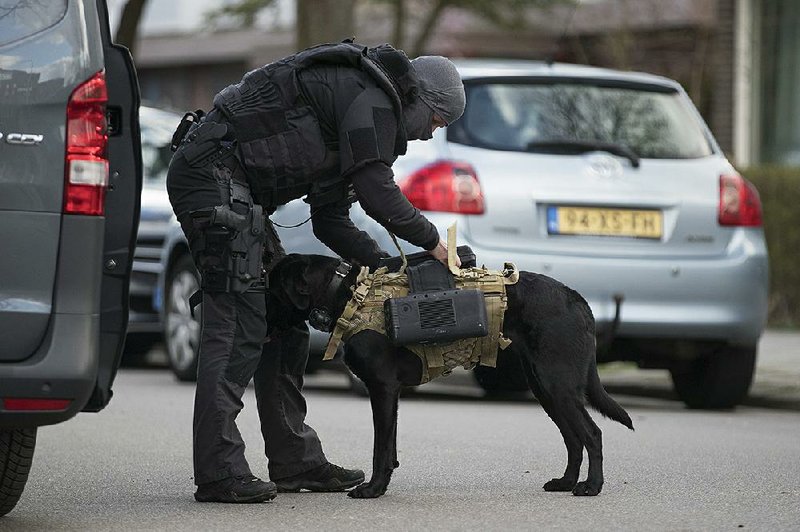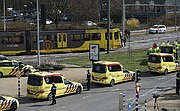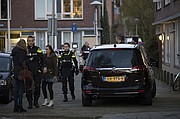UTRECHT, Netherlands -- A man opened fire Monday on a tram in the Dutch city of Utrecht, killing three people and injuring five.
Authorities seized a Turkish-born suspect after a manhunt that convulsed the historic city of nearly 350,000 people for most of the day.
As night set in, three victims lay in critical condition, and the motive for the bloodshed remained under investigation. Prime Minister Mark Rutte said authorities were trying to determine whether the attack had "terror motives."
Justice Minister Ferd Grapperhaus said the suspect, identified as Gokmen Tanis, 37, was known to justice authorities and had a criminal record. Grapperhaus declined to elaborate, citing the need for an unbiased investigation. Police said they also detained another man on suspicion of involvement but released no details.
The shooting came three days after 50 people were killed when a gunman opened fire at two mosques in Christchurch, New Zealand, during Friday prayers. There was no immediate indication of any link between the two events.
The Utrecht attack took place at a busy intersection in a residential neighborhood. The gunman was alleged to have had an automatic weapon, Grapperhaus said.
"We assume a terror motive," Mayor Jan van Zanen said as police searched for the killer, though he added that other motives could not be ruled out.
Police spokesmen told local news outlets that domestic violence was also a possibility.
In the aftermath of the shooting, Dutch authorities put the Netherlands' fourth-largest city on lockdown, raised the threat level in the area to the maximum of 5 and tightened security at airports and key buildings in the country. Police issued a photo of a bearded Tanis aboard a tram in a blue hooded top.
"If it is a terror attack," the prime minister declared, "then we have only one answer: Our nation, democracy, must be stronger than fanaticism and violence."
Heavily armed officers with dogs searched for the suspect, gathering at one point in front of an apartment building close to the scene. However, Tanis was later arrested at another location in the city. The threat level soon returned to 4.
Police said a red Renault compact car was carjacked shortly before the shooting and later found across town.
Local media said Tanis had been charged several times over the past years with offenses ranging from attempted manslaughter to petty crime in and around Utrecht. Two weeks ago, he was in court on charges of raping a woman in 2017, news reports said.
The identities of the shooting victims were not immediately released, and Grapperhaus would not say if any were known to the gunman.
'POP-POP-POP'
The shooting, coming three days after an attack on mosques in New Zealand killed 50 worshipers and left 40 injured, set off alarms in Europe. Dutch authorities unleashed a widespread emergency response even as the extent of the attack and its motivations remained unclear.
The attack appeared to cause some confusion among Dutch authorities scrambling to respond to a burst of violence in a turbulent period. Officials said at first that nine people were injured, then revised the number downward; they also offered contradictory statements about whether there were multiple shooting sites before agreeing there was only one.
Witness accounts of the attack were somewhat contradictory, with at least one witness saying that a woman on the tram appeared to have been targeted. Others told local media that an attacker sprayed fire more indiscriminately.
One witness quoted by the NRC newspaper said a man got up inside the tram and started shooting with a "big pistol."
"He shot around him, but seemed to be aiming at people sitting on the benches. Everybody ducked away," said the witness, who NRC said spoke on the condition of anonymity. "The conductor did not open the doors immediately. Two boys next to me kicked in a window, so I jumped outside. Several people did that."
Another witness said the attacker was shooting at one woman and then targeted people who tried to help her.
"We heard pop-pop-pop sounds, as though there was a silencer," the witness, who was identified only as Niels, told the Algemeen Dagblad newspaper. "I felt that he was focusing specifically on someone, because I saw a woman crawling away. Bystanders tried to pull her out, but when they did, the man went after her specially and aimed at the bystanders."
Authorities also increased security across the country. In Rotterdam, police said they were boosting security at mosques and at train stations. In the Dutch seat of government, The Hague, the military police who patrol government buildings carried their rifles at the ready, a different posture from normal, according to Dutch media.
All mosques in Utrecht were closed after the incident, according to a spokesman for the Ulu Mosque, Utrecht's biggest, who was quoted by the ANP news agency.
Political parties halted campaigning ahead of provincial elections scheduled for Wednesday that will also determine the makeup of the parliament's upper house. A televised debate also was canceled. It was not clear if campaigning would resume today.
TURKEY INVESTIGATES
Tanis was described by acquaintances as a sometimes-religious man with a criminal record who may have been entangled in a family dispute.
"He's very religious," but also "a real guy of the streets, aggressive as well," Alptekin Akdogan, who said he knew Tanis, told The New York Times. He said he and Tanis had grown up in the Kanaleneiland neighborhood.
Zabit Elmaci, 39, said he used to work with Tanis, washing dishes in a restaurant called Abrikoos. He described Tanis as "always in trouble."
"I don't remember him as a religious person, but about two years ago he started acting weird, so I gradually stopped seeing him," Elmaci said.
Tanis was born in the central Turkish town of Yozgat, according to both Akdogan and Zeki Baran, director of the Netherlands Yozgat Federation.
"We don't know much about him, except for that his father told us that he had not been in touch with his family for a long time," Baran said. A relative of the suspect is a candidate for mayor of Yozgat, he added.
President Recep Tayyip Erdogan of Turkey said Monday night that Turkish intelligence agencies were investigating the Utrecht shooting further. "Some say that it is a family dispute, others say it is a terrorist act," Erdogan told Turkish television.
According to the Turkish state-run news agency Anadolu, relatives of Tanis said that the shooting had originated from a family dispute, and that only one person had been the intended target. Similar accounts came from people who knew him in the Netherlands.
Information for this article was contributed by Aleksander Furtula, Mike Corder, Raf Casert, Geir Moulson and David Rising of The Associated Press; by Michael Birnbaum and Amar Nadhir of The Washington Post; and by Milan Schreuer and Richard Perez-Pena of The New York Times.
A Section on 03/19/2019


